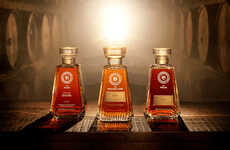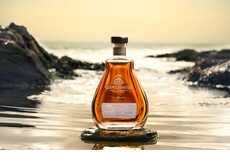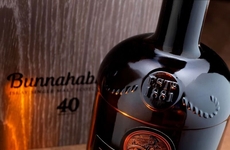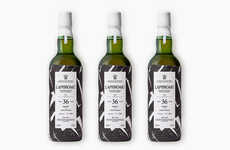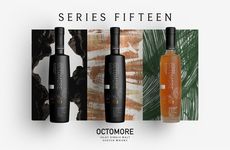
Bruichladdich's Scotch Whiskies are Branded as "The Last of Their Kind"
Laura McQuarrie — November 15, 2017 — Lifestyle
References: scotchwhisky & thespiritsbusiness
Bruichladdich is a distillery on the isle of Islay in Scotland that recently released a trio of Scotch whiskies that feature the final casks from distillations in 1984, 1985 and 1986. As such, these bottles are being called "the last of their kind" and appeal to consumers who might fall prey to a fear of missing out.
While the 1984 bottling provides what Bruichladdich calls a "classic expression," the 1986 bottling is touted as an ultra-rare whisky "taken from seven oloroso Sherry butts filled in 1986, then transferred by McEwan into Pedro Ximénez Sherry butts from Bodegas Rey Fernando de Castilla in 2012."
The making of these spirits has seen three generations of distillers contribute to the making of the products, giving consumers the chance to experience history through their sense of taste.
While the 1984 bottling provides what Bruichladdich calls a "classic expression," the 1986 bottling is touted as an ultra-rare whisky "taken from seven oloroso Sherry butts filled in 1986, then transferred by McEwan into Pedro Ximénez Sherry butts from Bodegas Rey Fernando de Castilla in 2012."
The making of these spirits has seen three generations of distillers contribute to the making of the products, giving consumers the chance to experience history through their sense of taste.
Trend Themes
1. Aged Whisky Rarity - Capitalizing on aging and rarity to appeal to consumers with a fear of missing out.
2. History Through Taste - Providing consumers with a taste of history through multi-generational distilling practices.
3. Sherry Cask Ageing - Experimenting with ageing processes, such as ageing in sherry casks, for unique flavour profiles.
Industry Implications
1. Spirits and Liquor - Distilleries can produce unique, high-value products by experimenting with ageing processes.
2. Luxury Goods - The rarity of aged whisky provides a luxury product for consumers with a high willingness to pay.
3. Tourism and Hospitality - Distilleries can use multi-generational history to create immersive experiences, such as tastings and distillery tours.
5.3
Score
Popularity
Activity
Freshness


